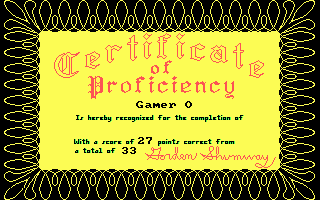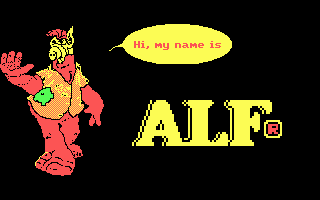Retro Replay Review
Gameplay
ALF’s Thinking Skills presents a trio of structured lessons designed to introduce young minds to basic logical concepts. In the first lesson, players navigate a miniature map of the Tanner household’s neighborhood, choosing between three roads marked by different stoplight colors. The objective is simple yet effective: guide ALF to the cat, Lucky, by identifying which traffic light is green. This early exercise helps children practice one-to-one correspondence and decision-making in a playful context.
(HEY YOU!! We hope you enjoy! We try not to run ads. So basically, this is a very expensive hobby running this site. Please consider joining us for updates, forums, and more. Network w/ us to make some cash or friends while retro gaming, and you can win some free retro games for posting. Okay, carry on 👍)
The second lesson elevates the challenge by introducing “and/or” logic using brightly colored shapes. Children must listen to ALF’s prompts—such as “Select the shapes that are red AND square”—and click on the correct combination. This exercise reinforces set theory basics and helps kids distinguish between overlapping conditions. ALF’s humorous commentary and occasional encouragement add a layer of personality that keeps learners engaged.
Finally, the third lesson combines both color and shape sorting into a more complex matching game. ALF asks players to sort a mixed batch of shapes into bins based on multiple criteria (“blue triangles” or “yellow circles,” for example). The increasing complexity helps children build their pattern-recognition skills and improve mental flexibility. Though the game’s pace is gentle, it steadily ramps up difficulty in a way that feels rewarding rather than frustrating.
Graphics
Visually, ALF’s Thinking Skills leans into the charm of early ’90s edutainment titles. The backgrounds are rendered in bright, blocky pixels that evoke nostalgic memories of classic console graphics. While far from photorealistic, the vibrant palette and clear, distinct shapes ensure that young players can easily distinguish game elements without confusion.
Character animations are brief but effective: ALF waddles cheerfully as he moves across the screen, occasionally waving or giving a thumbs-up when the player makes a correct choice. Lucky the cat appears in simple silhouette form, yet its silhouette and the context make its role immediately recognizable. The minimal animation serves its purpose, keeping the focus squarely on the puzzles rather than flashy visuals.
Each lesson screen employs consistent iconography and color coding, which helps kids form visual associations between tasks. The interface buttons are oversized and clearly labeled, aiding little hands in using mouse or keyboard controls. In short, while the graphics won’t impress seasoned gamers, they excel at clarity and child-friendly appeal.
Story
Though primarily an educational tool, ALF’s Thinking Skills weaves a light narrative thread around its lessons. The premise—that ALF is on a mission to snack on Lucky—provides just enough motivation to keep children curious about the next puzzle. Rather than relying on elaborate cutscenes, the game uses brief text bubbles and simple sound cues to advance its tongue-in-cheek storyline.
The humor is quintessentially ALF: playful, a bit mischievous, and always leaning into the character’s appetite for cats. Parents may appreciate that the game balances this dark humor with reminders that it’s “just pretend,” ensuring children aren’t disturbed by the notion of a cat-eating alien. This delicate tonal balance keeps the experience lighthearted.
By framing each logic exercise as part of ALF’s quest, the game adds narrative stakes to otherwise straightforward tasks. Players feel a mild sense of urgency—“Will ALF find Lucky?”—while they solve problems, making the lessons feel more like mini-adventures than rote drills. The story’s brevity is a plus, too: lessons flow quickly, so players stay focused on learning rather than lengthy exposition.
Overall Experience
ALF’s Thinking Skills delivers a solid blend of education and entertainment that should resonate with its target audience of early elementary–aged children. The three-lesson structure offers a clear progression, helping young learners build confidence as they master each new logical concept. For parents and educators, the title serves as a straightforward classroom supplement or at-home activity.
The game’s accessibility is a standout feature. With intuitive navigation, forgiving difficulty scaling, and the ever-present encouragement of ALF, even reluctant learners are likely to stay engaged. The replay value remains moderate—once the three lessons are completed, there’s limited new content—but replaying for speed or flawless answers can solidify the skills learned.
While graphics and sound are modest by today’s standards, they suit the game’s educational focus perfectly. ALF’s Thinking Skills does not aim to dazzle with spectacle; instead, it creates a welcoming environment where children can develop critical thinking at their own pace. For families seeking a lighthearted, logic-based learning tool with a beloved TV character at the helm, ALF’s Thinking Skills is a charming and effective choice.
 Retro Replay Retro Replay gaming reviews, news, emulation, geek stuff and more!
Retro Replay Retro Replay gaming reviews, news, emulation, geek stuff and more!









Reviews
There are no reviews yet.